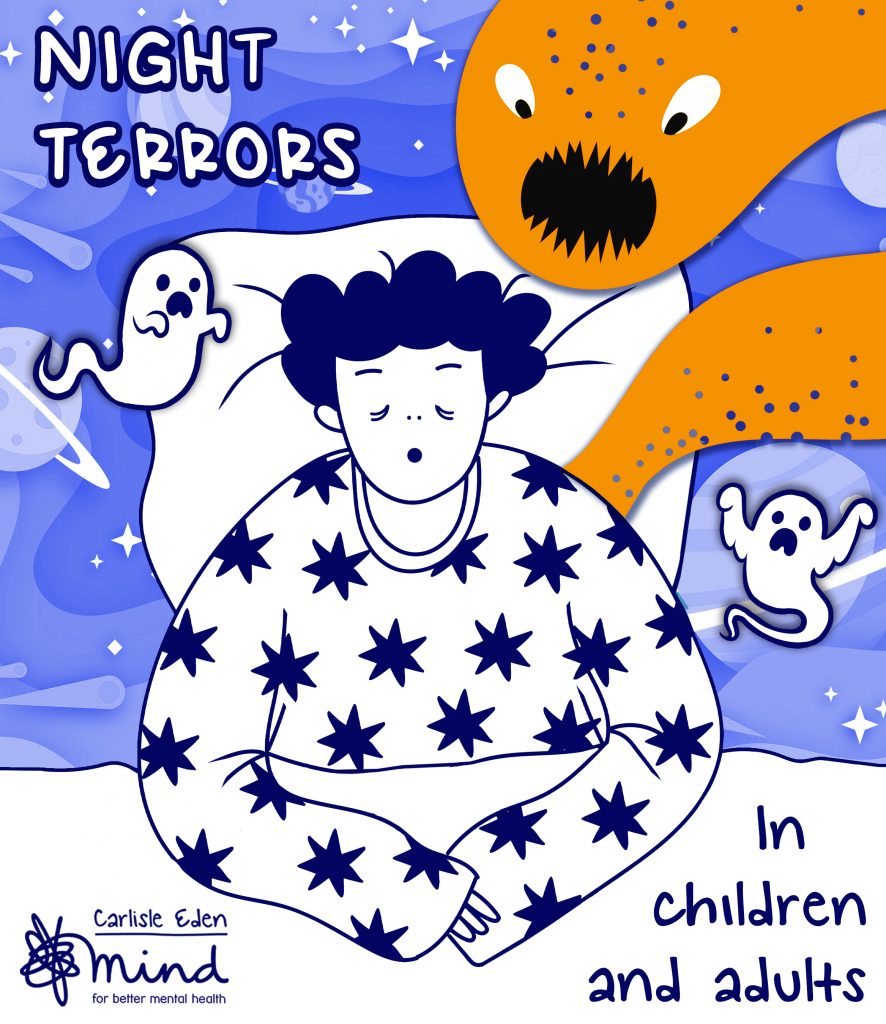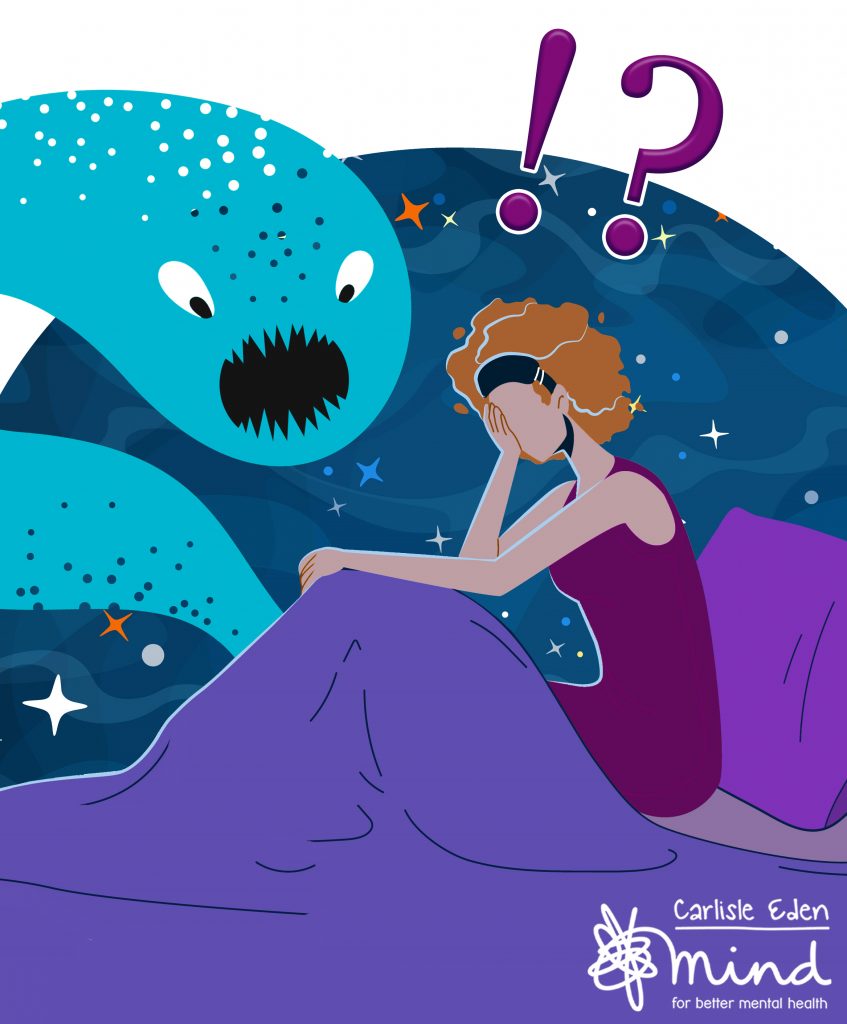Night terrors are very different from nightmares. Not as many people seem to be aware that night terrors even exist, but to those that do experience them, they can be hard to forget.
If you can remember back to when you were a young child, you may remember those deeply intense dreams you may have experienced. Night terrors can continue into adulthood for lots of different reasons, explained below, and they can leave people feeling that same confusion and fear. For some people night terrors can be so frequent that they dread going to sleep.

With this blog post we hope to help inform parents so that they can better support their child before, during and after a night terror. And for the adults that experience night terrors, hopefully after reading this blog post you will have a better understanding of why you are experiencing night terrors and find some useful tips to reduce and remove night terrors from your sleep.
What is a Night Terror?
Night terrors, also called sleep terrors, are a type of parasomnia, that occurs during non-REM (NREM) sleep. They usually occur during the first 3 to 4 hours of the night.
A person experiencing a night terror will suddenly begin to show signs of panic and terror while sleeping such as screaming, flailing, or kicking. More often than not a night terror is accompanied by sleep paralysis and the person will be trying their best to scream for help but all they can produce is a whisper. Due to the perceived intensity of a night terror, it is often accompanied by other symptoms like rapid heart rate and breathing, flushing of the skin, sweating, dilation of the pupils, and tensing of the muscles.
Children experiencing Night Terrors
For most parents, awakening to the sounds of a child screaming is an alarming occurrence, particularly when attempts to comfort your child are met with an unresponsive expression and flailing limbs. This isn’t a nightmare; it’s a night terror.
Although a child experiencing a night terror may open their eyes and appear to be intensely afraid of someone or something in the room, they are typically not responsive to those who try to wake them or provide comfort. They may even attempt to fight or escape, causing accidental injury to themselves or family members.
Most night terrors last about 10 minutes, but they can continue for 30 to 40 minutes in some children. After the episode, children often fall back into a deep sleep and typically have no memory of the night terror the next morning.
The frequency of night terrors can be hard to predict. Some children may experience them very rarely while others may have one to two episodes per month.
Why they happen
Night terrors are more common in children with a family history of night terrors or sleepwalking behaviour.
A night terror attack may be triggered by anything that:
- increases how much deep sleep your child has, such as tiredness, fever or certain types of medication
- makes your child more likely to wake from deep sleep, such as excitement, anxiety, sudden noise or a full bladder
In certain social settings at this age, like sleepovers or summer camps, a teen with a history of night terrors may feel some anxiety or embarrassment. If the tips in this blog post don’t help, consult with a doctor to help identify triggers or other contributing health conditions.
Should You Wake Up a Child Who Is experiencing a Night Terror?
When a child has a night terror, it’s natural to want to provide comfort. It’s best to stay close by and ensure that they do not fall or hurt themselves. However, do not try to wake a child during a night terror. Attempts to wake a child may make the episode last longer or provoke a physical response that could lead to injury. Most often these episodes are short, and your child will fall quickly back to sleep.
If night terrors occur repeatedly, ensure that your child’s bedroom is a safe environment by removing any potentially dangerous items and securing doors and windows. Make sure other caregivers and family members also know what to do if a night terror occurs.
Your child may not remember the episode the next morning, but it can still help to have a general chat to find out if anything is worrying them and triggering the episodes.
It’ll also help if they have a relaxing bedtime routine.
Try not to discuss the episodes with your child in a way that worries them as this may increase their anxiety.
If the night terror episodes are frequent and occur at a specific time every night, you may find that waking your child breaks the cycle. Wake your child 15 minutes before the anticipated time of the episode every night for 7 days.
This can disrupt their sleep pattern enough to stop the episodes without affecting sleep quality.
The most common age in which night terrors occur is a matter of ongoing debate. Most often, these episodes emerge when a child is between 4 and 12 years of age and resolve spontaneously by adolescence or puberty. However, a recent study showed the most common age for night terrors was 1.5 years old, with up to 35% of children this age having these episodes.
When you should seek help?
Most children eventually grow out of night terrors. But talk to your GP if they’re occurring several times a night or on most nights.
Your GP will be able to check whether something that’s easily treatable is causing the episodes.
For example, large tonsils could be causing breathing problems at night and waking your child.
In a small number of children who have frequent episodes of night terrors, referral to a specialist service may be needed.
Night Terrors in Adults
Adults experience night terrors much less frequently than young children.
Adults with a childhood history of night terrors may have a recurrence of the episodes, triggered by stress, sleep deprivation, or the development of another sleep disorder.
“I once had a night terror where an alien spaceship landed in my back garden, it all felt so real, I could see a pulsating light coming through the window and loud noise, within a split second I realised I had sleep paralysis and couldn’t move. I find that as soon as I identify what is going on, if I can try to force myself to laugh at the situation then it allows me snap out of it to wake up.”
What are the causes
Like other parasomnias, there is some evidence that night terrors have a genetic component and are more likely to occur in individuals who have a family history of parasomnia7, specifically a parent or sibling.
Additionally, people who have other sleep disorders like nocturnal asthma, obstructive sleep apnea, restless leg syndrome, or gastroesophageal reflux are increasingly recognized in those with night terrors. In particular, obstructive sleep apnea (OSA), a breathing disorder, is present in more than one-half of children who are referred to doctors for sleep terrors.
‘My night terrors would always be in the form of sleep paralysis. I would feel aware of my surroundings and feel like I’m awake but I cannot physically move. It can be quite frightening but I know that it’s induced by stressor from working long night shifts.’
In general, there is no significant association between night terrors and psychological disorders, in contrast to what has been suggested in other types of parasomnias.
While the conditions described above can predispose someone for parasomnias, a number of factors have been shown to trigger them:
- Fever
- Sleep deprivation
- Separation anxiety in children
- Periods of emotional distress or conflict
- Disruption of sleep schedule
- Certain medications
- Alcohol use and abuse
- Migraine headaches
- Head injury
A diagnosis can usually be made by reporting symptoms and sleep behaviours to your doctor. Other tests may be recommended if a person is experiencing other symptoms, such as sleep apnea, bedwetting, or seizures. A referral to a sleep specialist may be needed to rule out other sleep disorders or diagnose underlying health conditions.
I’ve worked many late night shifts and had such an upside-down sleep pattern that I started to experienced night terrors. One Time, I woke up to the noise of a large figure standing to the left of my bed making ‘click-click’ noises in my ear. It all felt very real, but it was all just in my head. After my body eventually snapped out of it I couldn’t get back to sleep for the remainder of the night. A few weeks later I was watching the movie Predator and the monster in the movie made the exact same click-click noise!’
Limit Caffeine and Alcohol
The overuse of stimulants like caffeine, alcohol, or other drugs or medication, may trigger night terror episodes. You should consider limiting the intake of these substances if you are experiencing recurrent occurrences of night terrors.

Nightmares:
Children experiencing nightmares
Nightmares are common in children aged 3 to 6 years old. Most children grow out of them.
Nightmares usually occur later in the night and cause strong feelings of terror, fear, distress or anxiety.
Your child may wake up and be able to remember and describe the dream to you.
Nightmares in children can be caused by a frightening experience, such as watching a scary film, or by something that’s worrying them.
What you should do
Talk to your child to find out whether anything is worrying them that could be triggering their nightmares.
As with night terrors, making sure your child has a relaxing bedtime routine will also help.
Take your child to see your GP if they’re having repeated nightmares (a series of nightmares with a recurring theme).
If your child’s nightmares are being caused by a stressful past experience, they may need counselling.
Nightmares in adults
Nightmares and night terrors are usually associated with young children, but they do also affect adults. Anyone who has had a night terror knows exactly what it feels like. Your mind is awake but your body is asleep and you cannot move due to sleep paralysis.
Nightmares are normal to experience and there are many possible causes of adult nightmares, but they’re often linked to stress, trauma or an existing mental health condition.
They can also occur after taking certain types of medication, such as antidepressants.
Sometimes a condition that affects sleep can be a trigger for night terrors.
For example:
Nightmares don’t usually cause any physical harm, but they can be disturbing or upsetting. They may also prevent you getting a good night’s sleep. Take a look at our blog posts:
10 Tips For A More Mindful Nights Sleep
How to cope with Sleep Problems
See your GP if you’re having regular nightmares that are affecting your sleep and day-to-day life.
If your nightmares are caused by a particular traumatic event, your GP may recommend psychological treatment, such as counselling.

















